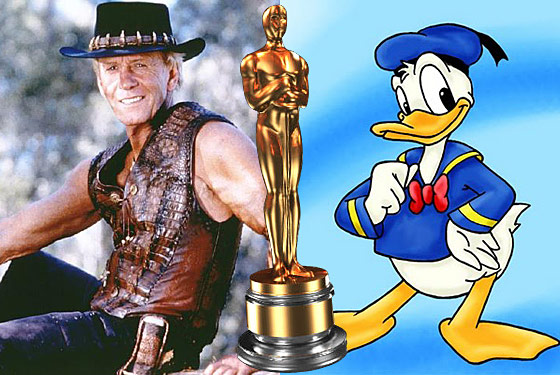
Still scratching your head over the pairing of James Franco and Anne Hathaway as the hosts of the 2011 Academy Awards? Whether it’s genius or madness, it’s not the weirdest pick the Oscars have ever made; in fact, in the years before Billy Crystal turned Oscar-hosting into a high-profile, much-discussed position, the Academy chose some very eclectic selections to preside over the industry’s most important night. Here are five odd Oscar-hosting decisions that make the Franco-Hathaway gig look positively ordinary.
Paul Hogan
Will it be awkward for James Franco to host the show the same year he’s expected to receive an Oscar nomination? At least a precedent has been set: In 1987, Paul Hogan co-hosted the ceremony and he, too, was up for an Oscar that night. Yes, that Paul Hogan. Yes, the star of Crocodile Dundee and noted tax dodger. Yes, he began his hosting patter with “G’day, viewers.” Alas, Hogan lost in the Best Original Screenplay category to Woody Allen (sure, why not).
Donald Duck
Animated characters often make a cameo at the Oscars (think of the tuxedo-clad Pixar characters who turn up when the nominees for Best Animated Film are called), but in 1957, Donald Duck was an actual co-host, appearing at the ceremony on film. Like Franco and Hathaway, Donald proved that the Academy is quick to reward actors who frequently go bottomless.
Bob Hope, David Niven, Tony Randall, Mort Sahl, Laurence Olivier, Jerry Lewis
Why have one Oscar host when you can have six? In 1959, the ceremony went with the odd combination of five funnymen and the dead-serious Olivier. Even with six hosts, the ceremony finished twenty minutes early — a near-inconceivable feat in the modern-day era of bloated award shows — and NBC had to cut to a sports rerun to fill the dead air.
Frank Capra
When the Oscars were in their infancy, there wasn’t any conventional wisdom on who should host (nor was there a telecast to worry about), and so it was that one of the biggest directors of the era, Frank Capra, ended up presiding over the eighth Academy Awards in 1936. It may have been a good career move: Capra had taken home the Best Director award the year before for It Happened One Night, and he got another one the following year for Mr. Deeds Goes to Town. (Capra also hosted the first ceremony where the trophies were actually dubbed “Oscars,” a nickname that became officially enshrined three years later.)
No Hosts
The Oscar-hosting gig might be a prestigious one, but for three of the most pivotal years in American history, no one took it. From 1969 to 1971, the Oscars went host-less (this, after a four-year run from Bob Hope), meaning no one was around to comment on unlikely victories like Midnight Cowboy’s X-rated triumph or the 1969 Best Actress tie between Katharine Hepburn and Barbra Streisand. The ceremony has forgone a host only once since; unfortunately, it was in 1989, when the show instead opened with a famously misbegotten musical number starring Rob Lowe and Snow White. (At least the Oscars recovered quickly: The next year, Billy Crystal hosted for the first time.)

